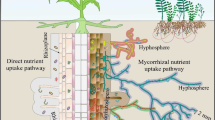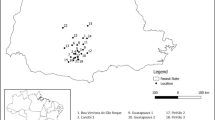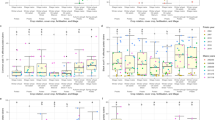Abstract
Over the last 20 years many new species of N2-fixing bacteria have been discovered in association with grasses, cereals and other non-nodulating crops. Virtually all of these bacteria are microaerophylic, fixing N2 only in the presence of low partial pressures of oxygen. Until a few years ago much attention was focussed on members the genusAzospirillum and it was assumed that N2 fixation was restricted to the rhizosphere or rhizoplane of the host plants. Through the use of N balance and15N techniques it has been shown that in the case of lowland rice, several tropical pasture grasses and especially sugar cane, the contributions of biological N2 fixation (BNF) are of agronomic significance.
More detailed study of the N2-fixing bacteria associated with sugar cane (Acetobacter diazotrophicus andHerbaspirillum spp.) has shown that they occur in high numbers not only in roots of this crop but also in the stems, leaves and trash but are rarely found in the soil. Some of these endophytic diazotrophs have now also been found in forage grasses, cereals, sweet potato and cassava, although evidence of significant BNF contributions is still lacking.
The identification of these endophytic diazotrophs as the organisms probably responsible for the high contributions of N2 fixation observed in sugar cane suggests that it may be possible to attain significant BNF contributions in some other gramineae and perhaps root crops.
Similar content being viewed by others
References
App A, Santiago T, Daez C, Menguito G, Ventura W, Tirol A, Po J, Watanabe I, De Datta SK and Roger P (1984) Estimation of the nitrogen balance for irrigated rice and the contribution of phototrophic nitrogen fixation. Field Crops Res 9: 17–27
App AA, Watanabe I, Alexander M, Ventura W, Daez G, Santiago T and De Datta SK (1980) Nonsymbiotic nitrogen fixation associated with the rice plant in flooded soils. Soil Sci 130: 283–289
App AA, Watanabe I, Ventura TS, Bravo M and Jurey CD (1986) The effect of cultivated and wild rice varieties on the nitrogen balance of flooded soil. Soil Sci 141: 448–452
Baldani VLD and Döbereiner J (1980) Host-plant specificity in the infection of cereals withAzospirilum spp. Soil Biol Biochem 12: 433–439
Baldani JI, Pereira PAA, Rocha REM da and Döbereiner J (1981) Especificidade na infecção de raízes porAzospirillum spp. em plantas com via fotossintética C3 e C4. Pesq Agropec Bras 16: 325–330
Baldani VLD, Baldani JI and Döbereiner J (1983) Effects ofAzospirillum inoculation on root infection and nitrogen incorporation in wheat. Can J Microbiol 29: 924–929
Baldani JI, Baldani VLD, Seldin L and Döbereiner J (1986) Characterization ofHerbaspirillum seropedicae gen. nov., sp. nov., a root-associated nitrogen-fixing bacterium. Int J Syst Bacteriol 36: 86–93
Baldani VLD, Alvarez MA de B, Baldani JI and Döbereiner J (1986) Establishment of inoculatedAzospirillum spp. in the rhizosphere and in roots of field grown wheat and sorghum. Plant Soil 90: 35–46
Baldani VLD, Baldani JI and Döbereiner J (1987) Inoculation of field-grown wheat (Triticum aestivum) withAzospirillum spp. in Brazil. Biol Fertil Soils 4: 37–40
Baldani VLD, Baldani JI, Olivares FL and Döbereiner J (1992) Identification and ecology ofHerbaspirillum seropedicae and the closely relatedPseudomonas rubrisubalbicans. Symbiosis 13: 65–73
Baldani VLD, James E, Baldani JI and Döbereiner J (1992) Localization of the N2-fixing bacteriaHerbaspirillum seropedicae within root cells of rice. An Acad Bras Cienc 64: 431
Bashan Y and Levanony H (1990) Current status ofAzospirillum inoculation technology:Azospirillum as a challenge for agriculture. Can J Microbiol. 36: 591–608
Berkum P van and Bohlool BB (1980) Evaluation of nitrogen fixation by bacteria in association with roots of tropical grasses. Microbiol Rev 44: 491–517
Berkum P van, Mc Clung CR and Sloger C (1982) Some pertinent remarks on N2 fixation associated with the roots of grasses.In: Graham PH and Harris SC (ed) Biological Nitrogen Fixation Technology for Tropical Agriculture, pp 513–525. Centro International de Agricultura Tropical (CIAT), Cali, Colômbia
Boddey RM and Döbereiner J (1982) Association ofAzospirillum and other diazotrophs with tropical graminae.In: Non-Symbiotic Nitrogen Fixation and Organic Matter in the Tropics, pp 28–47. Indian Society of Soil Science, New Delhi
Boddey RM and Döbereiner J (1988) Nitrogen fixation associated with grasses and cereals: recent results and perspectives for future research. Plant Soil 108: 53–65
Boddey RM and Victoria RL (1986) Estimation of biological nitrogen fixation associated withBrachiaria andPaspalum grasses using15N labelled organic matter and fertilizer. Plant Soil 90: 265–292
Boddey RM, Baldani VLD, Baldani JI and Döbereiner J (1986) Effect of inoculation ofAzospirillum spp. on the nitrogen assimilation of field grown wheat. Plant Soil 95: 109–121
Boddey RM, Urquiaga S, Reis V and Döbereiner J (1991) Biological nitrogen fixation associated with sugar cane. Plant Soil 137: 111–117
Boureau M (1977) Application de la chromatographie en phase gazeuse à l'étude de l'exudation racinaire du riz. Cah ORSTOM sér Biol 12: 75–81
Cavalcante VA and Döbereiner J (1988) A new acid-tolerant nitrogen-fixing bacterium associated with sugarcane. Plant Soil 108: 23–31
Cojho EH, Reis VM, Schenberg ACG and Döbereiner J (1993) Interactions ofAcetobacter diazotrophicus with an amylolytic yeast in nitrogen-free batch culture. FEMS Microbiol Lett 106: 341–346
De Polli H, Matsui E, Döbereiner J and Salati E (1977) Confirmation of nitrogen fixation in two tropical grasses by15N2 incorporation. Soil Biol Biochem 9: 119–123
Dilworth MJ (1966) Acetylene reduction by nitrogen fixing preparations ofClostridium pasteurianum. Biochem Biophys Acta 127: 285–294
Döbereiner J and Day JM (1975) Associative symbioses in tropical grasses: characterization of microorganisms and nitrogen-fixing sites.In: Newton WE and Nyman CJ (ed) Proceedings of the 1st International Symposium on Nitrogen Fixation, pp 518–538. Washington State University Press, Pullman
Döbereiner J, Day JM and Dart PJ (1972) Nitrogenase activity in the rhizosphere of sugar cane and some other tropical grasses. Plant Soil 37: 191–196
Döbereiner J, Reis V and Lazarine AC (1988) A new N2 fixing bacteria in association with cereals and sugarcane.In: Bothe H, De Bruijn FJ de and Newtan WE (ed) Nitrogen Fixation: Hundred years after, pp 717–722. Gustav Fischer, Stuttgart
Döbereiner J, Reis VM, Paula MA and Olivares F de (1993) Endophytic diazotrophs in sugar cane, cereals and tuber plants.In: Palacios R, Mora J and Newton WR (ed) New Horizons in Nitrogen Fixation, pp 671–676. CRC Press, Dordrecht, Netherlands
Eskew DL, Eaglesham ARJ and App AA (1981) Heterotrophic N2 fixation and distribution of newly fixed nitrogen in a rice-flooded soil system. Plant Physiol 68: 48–52
Fages J (1994)Azospirillum inoculants and field experiments.In: Okon Y (ed)Azospirillum/Plant Associations, pp 87–109. CRC Press, Boca Raton, Florida
Fallik E, Okon Y and Fischer M (1988) The effect ofAzospirillum brasilense inoculation on metabolic enzyme activity in maize root seedlings. Symbiosis 6: 17–28
Ferreira MCB, Fernandes MS and Döbereiner J (1987) Role ofAzospirillum brasilense nitrate reductase in nitrate assimilation by wheat plants. Biol Fertil Soils 4: 47–53
Freitas JLM de, Rocha REM da, Pereira PAA and Döbereiner J (1982) Matéria orgânica e inoculação comAzospirillum na incorporação de N pelo milho. Pesq Agropec Bras 17: 1423–1432
Fuentes-Ramirez LE, Jiminez-Salgado T, Abarca-Ocampo IR and Caballero Mellado J (1993)Acetobacter diazotrophicus, an indolacetic acid-producing bacterium isolated from sugarcane cultivars in Mexico. Plant Soil 154: 145–150
Garcia de Salamone IE (1993) Influencia de bacterias del generoAzospirillum sobre el rendimento y nutricion nitrogenada del cultivo de maiz (Zea mays L.). MSc thesis, University of Buenos Aires. 172p
Gaskins MH, Albrecht SL and Hubbell DH (1985) Rhizosphere bacteria and their use to increase plant productivity. Agric Ecosys Environ 12: 99–116
Giller KE and Day JM (1985) Nitrogen fixation in the rhizosphere: significance in natural and agricultural systems.In: Fitter AH (ed) Ecological Interactions in Soil, pp 127–147. Blackwell Scientific Publication, Oxford
Gillis M, Döbereiner J, Pot B, Goor M, Falsen E, Hoste B, Reinhold B and Kersters K (1991) Taxonomic relationships between [Pseudomonas]rubrisubalbicans, some clinical isolates (EF group 1),Herbaspirillum seropedicae and [Aquaspirillum]autotrophicum.In: Polsinelli M, Materassi R and Vincenzini M (ed) Nitrogen Fixation, pp 292–294. Kluwer Academic Publ., Dordrecht, Netherlands
Gillis M, Kerters B, Hoste DJ, Kroppenstedt RM, Stephan MP, Teixeira KRS, Döbereiner J and De Ley J (1989)Acetobacter diazotrophicus sp. nov. a nitrogen fixing acetic acid bacterium associated with sugar cane. Int J Syst Bacteriol 39: 361–364
Hill S (1971) Influence of oxygen concentration on the colony type ofDerxia gummosa grown on nitrogen-free media. J Gen Microbiol 67: 77–83
Hill S, Drozd JW and Postgate JR (1972) Environmental effects on the growth of nitrogen-fixing bacteria. J Appl Chem Biotechnol 22: 541–558
Hurek T, Reinhold-Hurek B, Van Montagu M and Kellenberger E (1991) Infection of intact roots of Kallar grass and rice seedlings by ‘Azoarcus’ Dev. Plant Soil Sci 48: 235–242
Ito O, Cabrera D and Watanabe I (1980) Fixation of dinitrogen-15 associated with rice plants. Appl Environ Microbiol 39: 554–558
Jain DK and Patriquin DG (1985) Characterization of a substance produced byAzospirillum which causes branching of root hairs. Can J Microbiol 31: 206–210
James EK, Reis VM, Olivares FL, Baldani JI and Döbereiner J (1994) Infection of sugar cane by the nitrogen-fixing bacteriumAcetobacter diazotrophicus. J Exp Bot 45: 757–766
Kapulnik Y, Feldman M, Okon Y and Henis Y (1985) Contribution of nitrogen fixed byAzospirillum to the N nutrition of spring wheat in Israel. Soil Biol Biochem 17: 509–515
Kapulnik Y, Okon Y and Henis Y (1985) Changes in root morphology of wheat caused byAzospirillum inoculation. Can J Microbiol 31: 881–887
Kennedy IR and Tchan YT (1992) Biological nitrogen fixation in non-leguminous field crops: Recent advances. Plant Soil 141: 93–118
Khammas KM, Ageron E, Grimont PAD and Kaiser P (1989)Azospirillum irakense sp. nov., a nitrogen-fixing bacterium associated with rice roots and rhizosphere soil. Res Microbiol 140: 679–693
Koyama T and App AA (1979) Nitrogen balance in flooded rice soils.In: Nitrogen and Rice, pp 95–104. IRRI, Manila, Philippines
Li R and MacRae IC (1992) Specific identification and enumeration ofAcetobacter diazotrophicus in sugarcane. Soil Biol Biochem 24: 413–419
Lima E, Boddey RM and Döbereiner J (1987) Quantification of biological nitrogen fixation associated with sugar cane using a15N aided nitrogen balance. Soil Biol Biochem 19: 165–170
Lin W, Okon Y and Hardy RWF (1983) Enhanced mineral uptake byZea mays andSorghum bicolor roots inoculated withAzospirillum brasilense. Appl Environ Microbiol 45: 1775–1779
Magalhães FM, Baldani JI, Souto SM, Kuykendall JR and Döbereiner J (1983) A new acid-tolerantAzospirillum species. An Acad Bras Cienc 55: 417–430
Magalhães FMM, Patriquin D and Döbereiner J (1979) Infection of field grown maize withAzospirillum spp. R Bras Biol 39: 587–596
McClung CR, Patriquin DG and Davis RE (1983)Campylobacter nitrofigilis sp. nov., a nitrogen-fixing bacterium associated with roots ofSpartina alterniflora loisel. Int J Syst Bacteriol 33: 605–612
Millet E, Avivi Y and Feldman M (1984) Yield response of various wheat genotypes to inoculation withAzospirillum brasilense. Plant Soil 80: 261–266
Miranda CHB and Boddey RM (1987) Estimation of biological nitrogen fixation associated with 11 ecotypes ofPanicum maximum grown in nitrogen-15-labeled soil. Agron J 79: 558–563
Miranda CHB, Urquiaga S and Boddey RM (1990) Selection of ecotypes ofPanicum maximum for associated biological nitrogen fixation using the15N isotope dilution technique. Soil Biol Biochem 22: 657–663
Morris DR, Zuberer DA and Weaver RW (1985) Nitrogen fixation by intact grass-soil cores using15N2 and acetylene reduction. Soil Biol Biochem 17: 87–91
Okon Y and Kapulnik Y (1986) Development and function ofAzospirillum-inoculated roots. Plant Soil 90: 3–16
Olivares FL, Baldani VLD, Baldani JI Döbereiner J (1993) Ecology ofHerbaspirillum spp. and ways of infection and colonization of cereals with these endophytic diazotrophs.In: Poster at 6th Int. Symp. Nitrogen Fixation with Nonlegumes. Ismailia, Egypt. 6–10 Sept. Program and Abstracts 118p
Oliveira E (1992) Estudo da associação entre bactérias dia-zotróficas e arroz. MSc Thesis, Universidade Federal Rural do Rio de Janeiro, Itaguaí, RJ
Patriquin DG and Döbereiner J (1978) Light microscopy observations of tetrazolium-reducing bacteria in the endorhizosphere of maize and other grasses in Brazil. Can J Microbiol 24: 734–742
Paula MA de, Döbereiner J and Siqueira JO (1989) Efeito da inoculaçao com fungo micorrízico VA e bactérias diazotróficas no crescimento e produçao de batata-doce.In: 22° Congresso Brasileiro de Ciência do Solo, pp 109. Recife: Sociedade Brasileira de Ciência do Solo. Programa e resumos
Paula MA de, Reis VM and Döbereiner J (1991) Interactions ofGlomus clarum withAcetobacter diazotrophicus in infection of sweet potato (Ipomoea batatas), sugarcane (Saccharum spp.) and sweet sorghum (Sorghum vulgare). Biol Fertil Soils 11: 111–115
Pimentel JP, Olivares F, Pitard RM, Urquiaga S, Akiba F and Döbereiner J (1991) Dinitrogen fixation and infection of grass leaves byPseudomonas rubrisubalbicans andHerbaspirillum seropedicae. Plant Soil 137; 61–65
Reinhold B, Hurek T, Fendrik I, Pot B, Gillis M, Kersters K, Thielemans S and De Ley J (1987)Azospirillum halopraeferens sp. nov., a nitrogen-fixing organism associated with roots of kallar grass (Leptochloa fusca L. Kunth). Int J Syst Bacteriol 37: 43–51
Reinhold Hurek B, Hurek T, Gillis M, Hoste B, Vancanneyt M Kersters K and De Ley J (1993)Azoarcus gen. nov., a nitrogen fixing Proteobacteria associated with roots of Kallar grass (Leptochloa fusca (L.) Kunth), and description of two speciesAzoarcus indigens sp. nov. andAzoarcus communis sp. nov. Int J Syst. Bacteriol 43: 574–588
Reis VM, Zang Y and Burris RH (1990) Regulation of nitrogenase activity by ammonium and oxygen inAcetobacter diazotrophicus. An Acad Bras Cienc 62: 317
Reynders L and Vlassak K (1982) Use ofAzospirillum brasilense as biofertilizer in intensive wheat cropping. Plant Soil 66: 217–223
Rinaudo G and Dommergues Y (1971) Validité de l'estimation de la fixation biologique de l'azote dans la rhizosphere par la methode de reduction de l'acetylene. Ann Inst Pasteur 121: 93–99
Ruschel AP, Henis Y and Salati E (1975) Nitrogen-15 tracing of N-fixation with soil-grown sugar cane seedlings. Soil Biol Biochem 7: 181–182
Santiago Ventura T, Bravo M, Daez G, Ventura V, Watanabe I and App AA (1986) Effects of N-fertilizers, straw, and dry fallow on the nitrogen balance of a flooded soil planted with rice. Plant Soil 93: 405–411
Schank SC, Smith RL, Weiser GC, Zuberer DA, Bouton JH, Quesenberry KH, Tyler ME, Milam JR and Littell RC (1979) Fluorescent antibody technique to identifyAzospirillum brasilense associated with roots of grasses. Soil Biol Biochem 11: 287–295
Schöllhom R and Burris RH (1966) Study of intermediates in nitrogen fixation. Fed Proc 24: 710
Seldin L, Van Elsas JD and Penido EGC (1984)Bacillus azotofixans sp. nov., a nitrogen-fixing species from Brazilian soils and grass roots. Int J Syst Bacteriol 34: 451–456
Stephan MP, Oliveira M, Teixeira KRS, Martinez Dretz G and Döbereiner J (1991) Physiology and dinitrogen fixation ofAcetobacter diazotrophicus. FEMS Microbiol Lett 77: 67–72
Tarrand JJ, Krieg NR and Döbereiner J (1978) A taxonomic study of theSpirillum lipoferum group, with descriptions of a new genus,Azospirillum gen. nov. and two species,Azospirillum lipoferum (Beijerinck) comb. nov. andAzospirillum brasilense sp. nov. Can J Bot 24: 967–980
Teixeira KRS, Stephan MP and Döbereiner J (1987) Physiological studies ofSaccharobacter nitrocaptans a new acid tolerant N2-fixing bacterium.In: Poster presented at Fourth International Symposium on Nitrogen Fixation with Non-Legumes, Rio de Janeiro, Final program abstracts
Urquiaga S, Cruz KHS and Boddey RM (1992) Contribution of nitrogen fixation to sugar cane: Nitrogen-15 and nitrogen balance estimates. Soil Sci Soc Am J 56: 105–114
Von Bülow JFW and Döbereiner J (1975) Potential for nitrogen fixation in maize genotypes in Brazil. Proc Nat Acad Sci USA 72: 2389–2393
Walcott JJ, Chauviroj M, Chinchest A, Choticheuy P, Ferraris R and Norman BW (1977) Long-term productivity of intensive rice cropping systems on the central plain of Thailand. Exp Agric 13: 305–316
Wani SP, Chandrapalaiah S and Dart RJ (1985) Response of pearl millet cultivars to inoculation with nitrogen-fixing bacteria. Exp Agric 21: 175–182
Yoshida T and Ancajas RR (1971) Nitrogen fixation by bacteria in the root zone of rice. Soil Sci Soc Am Proc 35: 156–157
Yoshida T and Ancajas RR (1973) Nitrogen-fixing activity in upland and flooded rice fields. Soil Sci Soc Am Proc 37: 42–46
Yoshida T and Yoneyama T (1980) Atmospheric dinitrogen fixation in the flooded rice rhizosphere as determined by the N-15 isotope technique. Soil Sci Plant Nutr 26: 551–560
Zimmer W, Roeben K and Bothe H (1988) An alternative explanation for plant growth promotion by bacteria of the genusAzospirillum. Planta 176: 333–342
Author information
Authors and Affiliations
Rights and permissions
About this article
Cite this article
Boddey, R.M., Dobereiner, J. Nitrogen fixation associated with grasses and cereals: Recent progress and perspectives for the future. Fertilizer Research 42, 241–250 (1995). https://doi.org/10.1007/BF00750518
Issue Date:
DOI: https://doi.org/10.1007/BF00750518




